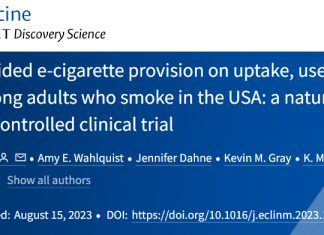
A new real world study journal has been published on The Lancet website – titled “Effect of unguided e-cigarette provision on uptake, use, and smoking cessation among adults who smoke in the USA: a naturalistic, randomised, controlled clinical trial“.

Not exactly a catchy or easy to understand title I grant you, but it turns out to be a very positive paper for vaping!
Journal Introduction
After several reads, I think I understand what this is about!
The reason for this study is the fact that previous clinical trials on e-cigarettes are mainly based on those who have the motivation to stop smoking.
This study aims to investigate how likely smokers who are not intent on quitting find the experience of vaping.
Methods
This is a “Naturalistic, Randomised Controlled Clinical Trial” which involved adult smokers from 11 cities from the US.
There were 2 groups of participants…
·E-cigarette group – these were provided with a free 4 week supply of flavoured vapes. The type of vape was a closed pod system (Njoy) with up to 30 pre-filled tanks with 5 flavours and little instruction on use.
·The second group (control group) did not receive any e-cigs.
The participants were then told they could use the vape however they wanted. They could use it alongside smoking or just use it on its own. They could use it every day or only when they wanted. The study wanted to find out how people would be motivated to try and stick to vaping.
Also they were given common sense information that e-cigs were “likely safer” than combustible cigarettes.
Follow up phone surveys took place on weeks 1,2,3,4,8,12 and 24.
Between May 2018 and March 2022 – 638 adult smokers were enrolled. 427 of these were in the E-cigarette group and 211 in the control (no e-cig) group.
Results
Approximately 70% of those in the e-cigarette group used the product and the average usage was for more than 4 days per week during the initial 30 days.


At 6 months (24 weeks) 44% of the e-cig group still reported using their vape. In the group which were not supplied with a free vape still 16% of them were still vaping.
Those in the e-cig group were more likely to self-report cigarette abstinence over the 4 week trial period and at follow up assessments within the 6 months.
At the final follow up, 14% of the e-cig group reported abstinence from cigarettes compared to 8% of the control group.
Also there were more quit attempts reported by week 24 for the e-cig group (26%) versus the control group (19%).
30% of the e-cig group and 12% of the control group reduced their amount of cigarettes per day (CPD) by 50% at week 12.
Conclusion
The study states…
“Complementing cessation focused trials, results suggest that unguided e-cigarette use also leads to smoking cessation, allaying the notion that causal effects of e-cigarettes on cessation are not reflective of real-world scenario of self determined use. For smokers who may not be able to quit using existing pharmacologic approaches, e-cigarettes may be considered to achieve that purpose”
